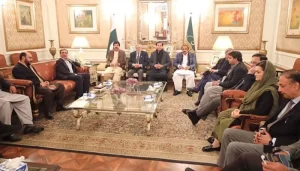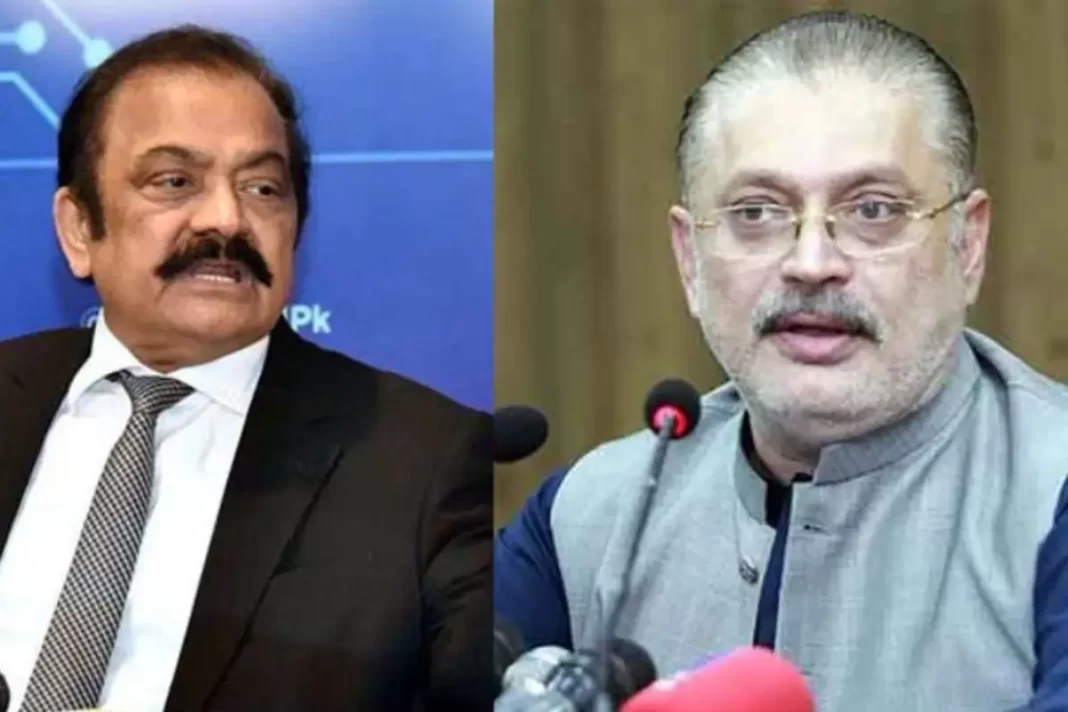The federal government decided on Sunday to start a conversation with the Sindh government to tackle the growing controversy surrounding a proposed canal project on the Indus River, which has created a significant divide among allies in the ruling coalition.
Sindh’s political tensions are rising over this contentious canal project, and the Centre and Sindh initiated discussions when Adviser to the Prime Minister, Rana Sanaullah, and Sindh’s Senior Minister, Sharjeel Inam Memon, connected over the phone. Their goal was to bridge the gap and find some common ground.
Both parties agreed that it’s better to resolve the issue through dialogue instead of confrontation. Sana mentioned that Prime Minister Shehbaz Sharif and Pakistan Muslim League-Nawaz (PML-N) President Nawaz Sharif had emphasized the importance of taking Sindh’s concerns seriously and starting a conversation.
On February 15, Punjab Chief Minister Maryam Nawaz Sharif and Chief of Army Staff (COAS) Gen Asim Munir launched an ambitious agricultural initiative aimed at irrigating the barren lands in Punjab’s Cholistan area.
The PPP, a key partner of the PML-N in the federal government, has been voicing significant concerns about the proposal to create six new canals from the Indus River to support the irrigation needs of the Green Pakistan Initiative (GPI) in the Cholistan desert.
Sanaullah has reportedly stated that it’s unacceptable to unlawfully divert any province’s share of water, emphasizing that the federal government is committed to a fair and just distribution of resources. He also mentioned that this issue shouldn’t be turned into a political battleground, insisting that open dialogue is the best path forward.
Just a day earlier, Sanaullah expressed that his party holds great respect for the PPP’s leadership, asserting that no injustice could occur as long as the 1991 Water Accord and the Indus River System Authority (Irsa) Act of 1992 are in effect, which regulate inter-provincial water sharing.
The prime minister’s political adviser made it clear that one province’s water cannot be redirected to another, as there are constitutional frameworks and laws designed to ensure equitable distribution of this vital resource.
In a recent statement, Sindh’s senior minister expressed appreciation for the federal government’s openness to dialogue, noting that both the PPP and the people of Sindh have significant concerns regarding the canals project. He emphasized that the party’s position is firmly rooted in the 1991 water agreement and reiterated Sindh’s strong opposition to any “unconstitutional diversion of its water.”
Tensions escalated dramatically when PPP Chairman Bilawal Bhutto Zardari delivered a pointed message to the federal government during a public rally in Hyderabad on April 18. “The PPP is insisting that the federal government put an immediate halt to the controversial canals project and acknowledge our objections,” he asserted, cautioning that if this demand is ignored, the PPP may withdraw its support from the PML-N government.
Time and again, the PPP Parliamentarians have threatened to bring down the PML-N government. This tension stems from a deal they struck before forming the federal government back in February 2024, following a split mandate in the general elections.
Even though the PPPP didn’t join the federal cabinet, both parties managed to share important constitutional offices. Bilawal’s warning comes despite Deputy Prime Minister Ishaq Dar’s assurance in the National Assembly on April 11 that no province would take a single drop of Sindh’s water share. “Everything will be discussed and settled before any steps are taken.”
In Lahore, the PML-N and PPPP have come together for a joint meeting.
The gathering took place at the Governor House, where members of the PML-N and PPP coordination committee aimed to resolve their differences. Senior leaders from both parties were present, including Deputy Prime Minister Ishaq Dar, who joined via video link, along with Rana Sanaullah, Punjab Assembly Speaker Malik Ahmad Khan, and PPP leaders Raja Pervaiz Ashraf, Nadeem Afzal Chan, and Syed Hassan Murtaza. The main focus of their discussions was on the concerns raised by the PPP.

After the meeting, Murtaza and Khan recognized the delicate nature of the water distribution issue. Khan pointed out that Irsa has already made decisions regarding this matter, and all parties have agreed to the document provided by Irsa. He emphasized that this ‘sacrosanct’ document outlines an agreement for distributing 107 million acre-feet of water.
Khan also mentioned that due to climate-related challenges, the current water availability is about 10 million acre-feet less than the total capacity. He noted that this shortage has led to growing concerns in Punjab.
When it came to the topic of water distribution, Khan pointed out that both sides were avoiding political discussions and instead focusing on the facts. He emphasized that Sindh had every right to “jealously guard” its water share, just like Punjab or any other province.
He reminisced about how the Kalabagh dam project was put on hold due to political disagreements. “The people of Pakistan are quite savvy when it comes to these discussions,” he noted. Regarding canals, he mentioned, “We need to address the concerns, and both sides should appreciate each other’s technical viewpoints.”
Hassan Murtaza from the PPP highlighted that while both parties had committed to collaborating for national stability, the PPP still had significant worries—not only about the canals but also about wheat procurement, local governance, and the struggles faced by farmers. “Sugarcane growers still haven’t received payments from the mills,” he remarked, pointing out the larger governance issues in Punjab.
According to sources within the party, the PPP raised concerns not just about water but also about development funds and the need for transparency in Punjab’s administration, urging the PML-N to take action. The PML-N reportedly requested a week to address these issues and assured that they would work towards resolving them.
For the latest updates and insights on new developments, visit the NEWSON
Q1. What is the controversy surrounding the canal project on the Indus River?
The proposed canal project has sparked a major political debate due to concerns about water distribution and the potential impact on downstream provinces. Critics argue that the initiative may divert water unfairly and violate inter-provincial agreements.
Q2. Why did the federal government initiate talks regarding the canal project?
The federal government began discussions to ease rising tensions and address growing concerns among coalition partners over water rights and the fair implementation of the canal initiative.
Q3. Who were the key figures involved in starting the dialogue?
Adviser to the Prime Minister Rana Sanaullah and a senior provincial minister connected via phone to discuss concerns, aiming to find common ground and promote dialogue over confrontation.
Q4. What role does the 1991 Water Accord play in this issue?
The 1991 Water Accord is central to the debate, as it outlines the legal framework for equitable water sharing between provinces. Both federal and provincial leaders have emphasized the importance of adhering to this agreement.
Q5. What has the Pakistan Peoples Party (PPP) said about the canal project?
The PPP has voiced strong opposition, warning that moving forward without addressing objections could lead to a withdrawal of political support from the ruling coalition. The party demands a halt to the project until concerns are resolved.
Q6. How has the federal government responded to the PPP’s concerns?
Federal leaders, including Rana Sanaullah and Deputy Prime Minister Ishaq Dar, have stressed that no decision will be made without consensus and that water distribution must remain fair and lawful.


